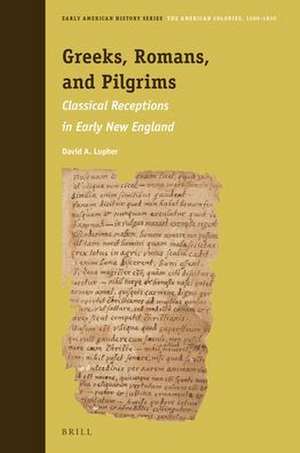Greeks, Romans, and Pilgrims: Classical Receptions in Early New England: Early American History Series, cartea 7
Autor David A. Lupheren Limba Engleză Hardback – 4 oct 2017
Preț: 922.34 lei
Preț vechi: 1124.80 lei
-18% Nou
Puncte Express: 1384
Preț estimativ în valută:
176.49€ • 184.76$ • 146.03£
176.49€ • 184.76$ • 146.03£
Carte indisponibilă temporar
Doresc să fiu notificat când acest titlu va fi disponibil:
Se trimite...
Preluare comenzi: 021 569.72.76
Specificații
ISBN-13: 9789004351172
ISBN-10: 9004351175
Dimensiuni: 155 x 235 mm
Greutate: 1.07 kg
Editura: Brill
Colecția Brill
Seria Early American History Series
ISBN-10: 9004351175
Dimensiuni: 155 x 235 mm
Greutate: 1.07 kg
Editura: Brill
Colecția Brill
Seria Early American History Series
Cuprins
Acknowledgments
Introduction
1 Classical Antiquity in Promotional Tracts for the Settlement of New England
Captain John Smith: “For Example: Rome”
Sir William Alexander and New Scotland
The “Melancholly Leasures” of William Morrell
The Model of Roman Colonization in John White’s Planters Plea (1630)
The Old World and the New in William Wood’s Prospect (1634)
Conclusion
2 Thomas Morton of Ma-re Mount: The “Lady of Learning” versus “Elephants of Wit”
“Mine Hoste of Ma-re Mount”
Thomas Morton’s Classical Indians
The Small Latin and Less Greek of Thomas Morton
Morton and Classical Poetry
Aristotle, Cicero, and Epictetus: Classical Prose Writers in New English Canaan
Mine Host of Ma-re Mount as Fabius Cunctator and the Capitol Geese: Morton and Ancient History
“Luscus” and Phaon’s Box: Morton and Classical Myth and Legend
Morton the Poet vs. the Stygian Tapster and the Puritan Procrustes
“New Englands Genius”: Leda the Swan [sic] and the Druids
“Carmen Elegiacum”: The Barren Doe of Virginia
“Rise, Oedipeus”: The May-pole at Ma-re Mount
“The Baccanall Triumphe of the Nine Worthies of New Canaan”
Maia vs. Flora / Morton vs. Bradford
3 “Booke Learning Despised”? Access to “Humane Learning” in Plymouth Plantation
A Pilgrim Book: The Wanderings of Elder Brewster’s Seneca
Bodin’s Plato and a Renaissance Humanist’s Dog-Eating Spaniards: From Brewster’s Shelves to Bradford’s
Greco-Roman Antiquity in Elder Brewster’s Library
Greece and Rome in the Libraries of Captains Standish and Willett
Pliny the Elder and Bradford’s Book Hunt in Duxbury (ca. 1647)
“The Untimly and Strang Deaths of Many of the Heathen Poets, and Comedians”
Bradford’s “Heathen Historians,” Ovid’s Tristia, and Guevara’s Marcus Aurelius: Classical “Ghosts” in Plymouth Plantation
Access to Classical Culture in Gov. Bradford’s Plymouth
4 Landing with Seneca, Founding with Pliny, Exiled with Ovid: Governor William Bradford and the Classics
Roman Stoics and the Pilgrim Venture: Cato at Utica, Seneca in the Bay of Naples
Plato, Seneca, Pliny the Elder, and the End of the “Common Course and Condition”
Bradford’s Plymouth and Ovid’s Tomis: Classics in Bradford’s Late Poetry and Notebooks
Governor Bradford and the Classics
Conclusion
Note on the Citation of Editions of Bradford’s Of Plimmoth Plantation
Bibliography
Primary Sources
Secondary Sources
Introduction
1 Classical Antiquity in Promotional Tracts for the Settlement of New England
Captain John Smith: “For Example: Rome”
Sir William Alexander and New Scotland
The “Melancholly Leasures” of William Morrell
The Model of Roman Colonization in John White’s Planters Plea (1630)
The Old World and the New in William Wood’s Prospect (1634)
Conclusion
2 Thomas Morton of Ma-re Mount: The “Lady of Learning” versus “Elephants of Wit”
“Mine Hoste of Ma-re Mount”
Thomas Morton’s Classical Indians
The Small Latin and Less Greek of Thomas Morton
Morton and Classical Poetry
Aristotle, Cicero, and Epictetus: Classical Prose Writers in New English Canaan
Mine Host of Ma-re Mount as Fabius Cunctator and the Capitol Geese: Morton and Ancient History
“Luscus” and Phaon’s Box: Morton and Classical Myth and Legend
Morton the Poet vs. the Stygian Tapster and the Puritan Procrustes
“New Englands Genius”: Leda the Swan [sic] and the Druids
“Carmen Elegiacum”: The Barren Doe of Virginia
“Rise, Oedipeus”: The May-pole at Ma-re Mount
“The Baccanall Triumphe of the Nine Worthies of New Canaan”
Maia vs. Flora / Morton vs. Bradford
3 “Booke Learning Despised”? Access to “Humane Learning” in Plymouth Plantation
A Pilgrim Book: The Wanderings of Elder Brewster’s Seneca
Bodin’s Plato and a Renaissance Humanist’s Dog-Eating Spaniards: From Brewster’s Shelves to Bradford’s
Greco-Roman Antiquity in Elder Brewster’s Library
Greece and Rome in the Libraries of Captains Standish and Willett
Pliny the Elder and Bradford’s Book Hunt in Duxbury (ca. 1647)
“The Untimly and Strang Deaths of Many of the Heathen Poets, and Comedians”
Bradford’s “Heathen Historians,” Ovid’s Tristia, and Guevara’s Marcus Aurelius: Classical “Ghosts” in Plymouth Plantation
Access to Classical Culture in Gov. Bradford’s Plymouth
4 Landing with Seneca, Founding with Pliny, Exiled with Ovid: Governor William Bradford and the Classics
Roman Stoics and the Pilgrim Venture: Cato at Utica, Seneca in the Bay of Naples
Plato, Seneca, Pliny the Elder, and the End of the “Common Course and Condition”
Bradford’s Plymouth and Ovid’s Tomis: Classics in Bradford’s Late Poetry and Notebooks
Governor Bradford and the Classics
Conclusion
Note on the Citation of Editions of Bradford’s Of Plimmoth Plantation
Bibliography
Primary Sources
Secondary Sources
Recenzii
"What emerges here is a unique case study in the transmission of texts and ideas which illustrates some of the ways in which classical motifs percolate over time into reception texts, mediated by the versions and translations to which individuals have access at a given cultural and political moment." - Emma Bridges and Joanna Paul, in: Greece and Rome, Vol. 65, No. 2 (2018), pp. 279-80
Notă biografică
David A. Lupher, Ph.D. (1970), Stanford University, is Professor of Classics Emeritus, University of Puget Sound. He is the author of Romans in a New World: Classical Models in Sixteenth-Century Spanish America (University of Michigan Press, 2003).











